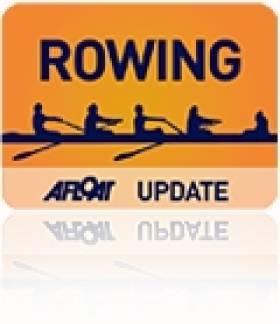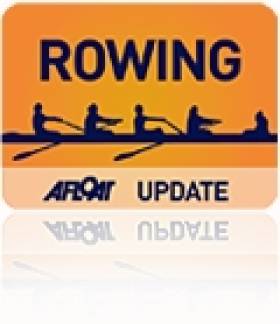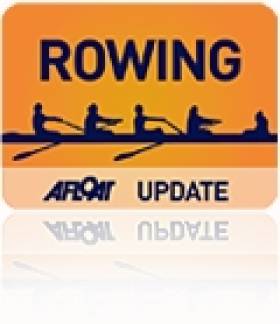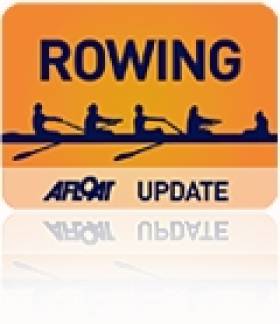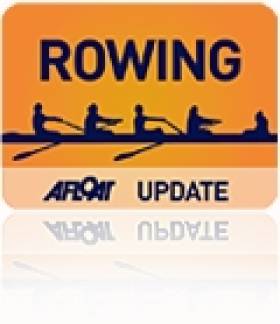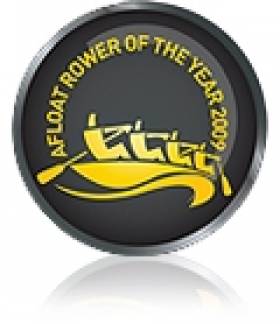Displaying items by tag: Puspure
#Rowing: A horde of Irish records fell at the Irish Indoor Rowing Championships at the University of Limerick today. Sanita Puspure set a new time for the women’s open category of 6 minutes 36.7 seconds. The second fastest time was also a record, as 17-year-old Emily Hegarty clocked 6:57.0, lopping over two seconds off the old junior record set by Lisa Dilleen. Claire Lambe’s time of 7 minutes 12.6 seconds was a new Irish record for a lightweight woman.
Paul O’Donovan set an excellent time for the lightweight under-23 category – 6:07.5 – over two seconds better than his previous personal best. His brother and soon-to-be Olympic crewmate, Gary, had been the fastest in the open lightweight section, with a time of 6:14.6. The men’s junior 18 category was won by Cathal Cummins in a new Irish record of 6:16.2. Sam McKeown’s hopes of breaking six minutes in the men’s open category fell short, though his time of 6:02.9 was 1.8 seconds better than his previous best.
Other record breakers on the day included Paul Gallen (lightweight men, 60 to 69), Niall O’Brien (open, 50-59), Priscilla O’Sullivan (women’s open, 50-59) and Catherine McKeon (pararowing, legs trunk and arms).
Irish Indoor Rowing Championships, University of Limerick, Saturday (Selected Results)
Men
Open: 1 S McKeown 6:02.9, 2 T Oliver 6:03.2, 3 P Buchanan 6:09.6, 4 P Doyle 6:10.7, 5 D Brown 6:13.0, 6 K Coughlan 6:13.1. Under-23: 1 J Casey 6:18.3, 2 D Mitchell 6:18.5, 3 P Munnelly 6:19.7. Junior 18: 1 C Cummins 6:16.2, 2 R Byrne 6:16.7, 3 D Lynch 6:18.3. Jun 16: R Tummon 6:38.2.
Lightweight – Open: 1 G O’Donovan 6:14.6, 2 M O’Donovan 6:18.0, 3 S O’Driscoll 6:18.8, 4 L Keane 6:24.8.
Under-23: 1 P O’Donovan 6:07.5, 2 S Mulvaney 6:21.8, 3 L Seaman 6:25.7
Pararowing – LTA (1,000m): S Ryan 3.30.6.
Women
Open: 1 S Puspure 6:36.7, 2 M Dukarska 6:58.9, 3 L Kennedy 7:01.9, 4 A Keogh 7:06.1, 5 S Bennett 7:13.8, 6 R Maguire 7:15.0. Under-23: 1 S Bounane 7:16.8, 2 E Lambe 7:18.6, 3 S Murphy 7:30.1. Junior 18: E Hegarty 6:57.0, 2 H Scott 7:20.7, 3 M Cremin 7:23.6. Jun 16: C Nic Dhonncha 7:35.6.
Lightweight – Open: 1 C Lambe 7:12.6, 2 Sarah Dolan 7:17.0, 3 S McCrohan 7:18.4. Under-23: E McGiff 7:41.9.
Pararowing – LTA (1,000m): C McKeon 3:37.1.
Best Overall Club (Eddie Crean Trophy): St Joseph’s, Galway
Puspure Wins in Switzerland in New Boat
#Rowing: Sanita Puspure won the women’s category at the Armada Cup in Switzerland. The Old Collegians sculler, competing for the first time in her new boat, was the fastest senior woman by over 20 seconds. Damir Martin of Croatia outpaced Mahe Drysdale of New Zealand to win the men’s open category. World champion Ondrej Synek was 12th.
Armada Cup, Bern, Switzerland (Selected Results)
Men, Open: 1 D Martin (Croatia) 33 mins 16.39 seconds, 2 M Drysdale (New Zealand) 33:40.73, 3 P Fraga (Portugal) 33:48.10.
Women, Open: 1 S Puspure (Ireland) 37:50.84, 2 M Milosevic (Croatia) 38:13.68, 3 K Milosevic (Croatia) 39:10.90.
Kennedy and O'Brien Win Women's Pair Trial
# Rowing: Leonora Kennedy and Barbara O’Brien won the women’s pair final at the Ireland trial at the National Rowing Centre, beating the combination of Monika Dukarska and Aifric Keogh. Michael Maher, a former lightweight international, competed in the heavyweight single and won that final. Paul O’Donovan was the convincing winner of the lightweight single, while his brother and partner in the lightweight double, Gary, was second, 19 seconds back. Sanita Puspure won her heat of the heavyweight single convincingly and was exempted from having to compete in a final.
Ireland Trial, National Rowing Centre, Cork, Sunday (Selected Results; Finals unless stated):
Men
Pair: UCD 7:21.23.
Single Sculls: 1 M Maher 7:56.61, 2 S McKeown 7:59.18, 3 R Byrne 8:02.46
Lightweight Single: 1 P O’Donovan 7:22.63, 2 G O’Donovan 7:41.77, 3 S O’Driscoll 7:48.99.
Women
Pair: 1 L Kennedy, B O’Brien 8:10.35, 2 M Dukarska, A Keogh 8:19.19.
Single Sculls – (Heat): S Puspure 7:50.46. Under-23: 1 E Hegarty 8:56.88, 2 E Lambe 9:11.60, 3 M Cremin 9:16.75.
Lightweight Single: 1 C Lambe 8:17.22, 2 Sarah Dolan 8:26.55, 3 D Walsh 8:27.77.
| Rowing Ireland - October Trials - Result of Finals |
| 12:30 |
| W2- |
| Final |
| 1 |
| Portora/UCC |
| 8:10:35 |
| 2 |
| Killorglin/UCC |
| 8:19:19 |
| 12:35 |
| WB1X |
| Final B |
| 1 |
| Lee - Synnott |
| 9:18:23 |
| 3 |
| UCC - O'Sullivan |
| 9:33:98 |
| 2 |
| Lee - Littlewood |
| 9:39:52 |
| 12:40 |
| WB1X |
| Final A |
| 1 |
| Skibbereen - Hegarty |
| 8:56:88 |
| 3 |
| UCD - Lambe |
| 9:11:60 |
| 2 |
| Lee - Cremin |
| 9:16:75 |
| 4 |
| Belfast - Blundell |
| 9:28:03 |
| 12:45 |
| M1X |
| Final C |
| 2 |
| Fermoy - Morrison |
| 8:16:64 |
| 3 |
| Shandon - O'Sullivan |
| 8:21:23 |
| 1 |
| Killorglin - Crowley |
| 8:21:81 |
| 4 |
| Portadown - Laivins |
| 8:51:18 |
| 12:50 |
| M1X |
| Final B |
| 2 |
| UCD - Hughes |
| 7:58:71 |
| 1 |
| UCC - Casey |
| 8:01;91 |
| 3 |
| Castleconnell - Whittle |
| 8:09:53 |
| 4 |
| Lee - Larkin |
| 8:13:00 |
| 12:55 |
| M1X |
| Final A |
| 3 |
| Commercial - Maher |
| 7:56:51 |
| 4 |
| Portadown - McKeown |
| 7:59:18 |
| 2 |
| Shandon - Byrne |
| 8:02:46 |
| 1 |
| OCBC - Neale |
| DNF |
| 13:05 |
| MS2- |
| Final |
| 0 |
| UCD 2- |
| 7:21:23 |
| 13:05 |
| WL1X |
| Final |
| 3 |
| OCBC - Lambe |
| 8:17:72 |
| 1 |
| Commercial - Dolan |
| 8:26:55 |
| 4 |
| Skibbereen - Walsh |
| 8:27:77 |
| 2 |
| Tribesman - McCrohan |
| 8:46:96 |
| 0 |
| Belfast - Quinn |
| 8:54:04 |
| 13:10 |
| LM1X |
| Final D |
| 1 |
| Cork - O'Connell |
| 8:08:19 |
| 3 |
| Skibbereen - Ryan |
| 8:09:69 |
| 2 |
| Shandon - Merz |
| 8:13:87 |
| 4 |
| Shandon - Channon |
| 8:20:34 |
| 13:15 |
| LM1X |
| Final C |
| 2 |
| Shandon - Prendergast |
| 7:59:09 |
| 1 |
| Shandon - Lonergan |
| 8:09:78 |
| 4 |
| UCC - Synnott |
| 8:16:14 |
| 3 |
| Skibbereen - McCarthy (J) |
| 8:21:42 |
| 13:20 |
| LM1X |
| Final B |
| 1 |
| St Michael's - O'Connor |
| 7:52:90 |
| 2 |
| Shandon - Hennessy |
| 7:57:56 |
| 3 |
| NUIG - Keane |
| 7:58:49 |
| 4 |
| Waterford - Goff |
| 8:01:08 |
| 13:25 |
| LM1X |
| Final A |
| 1 |
| Skibbereen - O'Donovan (P) |
| 7:22:63 |
| 2 |
| Skibbereen - O'Donovan (G) |
| 7:41:77 |
| 3 |
| Skibbereen - O'Driscoll |
| 7:48:99 |
| 4 |
| Skibbereen - McCarthy (F) |
| 8:00:48 |
Puspure So Close To Olympic Qualification at Aiguebelette
#Rowing: Sanita Puspure came up just short of gaining Olympic qualification for the Ireland single scull in a tight finish of the B Final at the World Championships in Aiguebelette in France this morning. The Old Collegians woman carved out an impressive lead of just over a length after 500 metres and held it until the final quarter. Just three from this race would qualify boats for Rio, and the field caught Puspure coming up to the finish. On the line, Puspure took fifth, .66 of a second behind third-placed Magdalena Lobnig of Austria.
World Rowing Championships, Aiguebelette, France – Day Eight (Irish interest)
Men
Lightweight Four - B Final (Places 7 to 12): 3 Britain (2 P Chambers) 5:56.29.
Single Sculls – B Final (Places 7 to 12): 2 Britain (A Campbell) 6:46.68
Women
Single Sculls – B Final (Places 7 to 12): 1 Sweden 7:26.60, 2 Lithuania 7:27.30, 3 Austria 7:27.52; 4 Belarus 7:27.86, 5 Ireland (S Puspure) 7:28.18, 6 Zimbabwe 7:31.74.
Puspure Bound For B Final at Lucerne
#Rowing: Sanita Puspure finished fifth in the A/B Semi-Final of the women’s single sculls at the World Cup regatta in Lucerne today. She is now set to compete in the B Final. Kim Crow of Australia set a hot pace, with Genevra Stone and Fie-Udby Erichsen of Denmark filling second and third in the early stages. Puspure was fifth after 500 metres and did not improve that position as the race went on. Fiona Bourke of New Zealand took third behind Crow and Stone.
World Cup Regatta, Lucerne – Day One (Irish interest; selected results)
Men
Lightweight Pair – Repechage (First Four to A Final): 4 Ireland (M O’Donovan, S O’Driscoll) 6:50.28.
Women
Double Sculls – A/B Semi-Final (First Three to A Final; rest to B Final): 1 Belarus 7:14.98, 2 Germany 7:17.52, 3 Greece 7:19.13; 5 Ireland (H Hannigan, L Dilleen) 7:26.75.
Lightweight Double – A/B Semi-Final (First Three to A Final; rest to B Final): 1 South Africa 7:35.26, 2 US 7:36.79, 3 Germany 7:39.14; 5 Ireland (C Lambe, S Jennings) 7:44.11
Single Sculls – A/B Semi-Final (First Three to A Final; rest to B Final): 1 Australia (K Crow) 7:55.81, 2 United States (G Stone) 8:00.20, 3 New Zealand (F Bourke) 8:03.10; 5 Ireland (S Puspure) 8:11.50.
Lightweight Single – Repechage One (Two to A Final; rest to B Final): 3 Ireland (D Walsh) 8:11.47.
Puspure Second in Heat at World Cup in Lucerne
#Rowing: Sanita Puspure took second place in her heat of the women’s single sculls at the World Cup regatta in Lucerne. There was just one qualification place on offer, and this was taken with aplomb by Kim Crow of Australia. Puspure was the one other competitor who put any pressure on Crow, but the in-form sculler had a clearwater lead down the course and won by over eight seconds.
Denise Walsh finsihed third in her heat of the lightweight single sculls. The race was won in stunning fashion by Zoe McBride of New Zealand, and she took the one qualification place for the A Final.
World Cup Regatta, Lucerne – Day One (Irish interest; selected results)
Men
Lightweight Pair – Heat One (First Directly to A Final; rest to repechages): 1 France 6:45.55; 2 Ireland (M O’Donovan, S O’Driscoll) 6:56.04
Lightweight Double Sculls – Heat Five (First Three Directly to Quarter-Finals): 1 Norway 6:17.32, 2 Ireland (G O’Donovan, P O’Driscoll) 6:20.20, 3 Portugal 6:21.09.
Women
Pair – Heat Three (First Two Directly to A/B Semi-Finals; rest to repechages): 1 Denmark 7:09.27, 2 South Africa 7:16.71; 6 Ireland (L Kennedy, M Dukarska) 7:44.68
Double Sculls – Heat Two (First Two Directly to A/B Semi-Finals; rest to repechage): 1 New Zealand 6:51.71, 2 Greece 6:53.20, 3 Ireland (H Hannigan, L Dilleen) 6:56.65
Lightweight Double Sculls – Heat One (First directly to A/B Semi-Finals; rest to repechages): 1 South Africa 6:54.01; 2 Ireland (C Lambe, S Jennings) 6:57.98
Single Sculls – Heat One (First directly to A/B Semi-Finals; rest to repechages): 1 Australia (K Crow) 7:30.62; 2 Ireland (S Puspure) 7:38.60
Lightweight Single Sculls – Heat Two (First directly to A Final; rest to repechages): 1 New Zealand (Z McBride) 7:32.88; 3 Ireland (D Walsh) 7:57.67.
Puspure Just Misses Out on Bronze in European Final
#ROWING: Ireland’s Sanita Puspure finished a close-up fifth in the A Final of the women’s single sculls at the European Rowing Championships in Poznan today. The pace for much of the race was set by Fie Udby Erichsen of Denmark, but Olympic champion Mirka Knapkova stayed calm and passed her in the final quarter to take gold ahead of Jeannine Gmelin of Switzerland, who took silver. Puspure, who was fifth at the 1500 metre mark, also finished fast, but was edged out of the bronze medal by Tatsiana Kukhta of Belarus. She was credited with the same time as fourth-placed Lina Saltyte of Lithuania, with Puspure .13 of a second back. Erichsen finished sixth.
European Rowing Championships, Poznan, Day Three (Irish interest)
Men
Lightweight Pair – A Final: 1 Britain (J Cassells, P Chambers) 6:28.58.
Lightweight Double Sculls – A Final: 1 France (S Delayre, J Azou) 6:11.38, 2 Britain (R Chambers, W Fletcher) 6:14.33, 3 Norway 6:15.53; 5 Ireland 6:21.89.
Women
Pair, B Final (Places 7 to 12): 1 Czech Republic 7:16.56, 2 Spain 7:17.04, 3 Ireland (L Kennedy, M Dukarska) 7:20.37.
Lightweight Double Sculls – A Final: 1 Britain 7:00.71, 2 Germany 7:05.27, 3 Poland 7:05.36; 6 Ireland (C Lambe, D Walsh) 7:13.41.
Single Sculls – A Final: 1 Czech Republic (M Knapkova) 7:30.24, 2 Switzerland (J Gmelin) 7:32.0, 3 Belarus (T Kukhta) 7:33.16; 4 Lithuania 7:33.16, 5 Ireland (S Puspure) 7:33.29, 6 Denmark 7:37.55.
Lightweight Single Sculls, B Final (Places 7 to 12): 1 Denmark (R Holmegaard) 7:40.62, 2 Ireland (S Jennings) 7:45.64, 3 Netherlands 7:49.94.
Puspure Gives Ireland Third A Finalist in Poznan
#ROWING: Sanita Puspure finished second in her repechage to secure an A Final spot at the European Rowing Championships in Poznan, Poland this morning. Puspure led early on, but the top two places were the key ones, and Puspure and Tatsiana Kukhta of Belarus nailed them down, as Julia Richter of Gernany and Eveline Peleman of Belgium struggled. Ireland wll have three boats in tomorrow's finals, as the men's and women's lightweight double sculls had already qualified.
European Rowing Championships, Poznan, Day Two (Irish interest)
Men
Lightweight Double Sculls – A/B Semi-Final One (Three to A Final; rest to B Final): 1 Britain (R Chambers, W Fletcher) 6:16.83, 2 Norway 6:21.02, 3 Ireland (P O’Donovan, G O’Donovan) 6:22.89; 4 Czech Republic 6:27.58, 5 Austria 6:31.75, 6 Greece 6:41.41.
Women
Pair – A/B Semi-Final One (Three to A Final; rest to B Final): 1 Netherlands 7:05.80, 2 Romania 7:09.40,3 France 7:13.10; 4 Czech Republic 7:14.97, 5 Ireland (L Kennedy, M Dukarska) 7:30.00, 6 Germany 7:34.45.
Lightweight Double Sculls – A/B Semi-Final One (Three to A Final; rest to B Final): 1 Poland 6:58.39, 2 Denmark 7:02.24, 3 Ireland (C Lambe, D Walsh) 7:02.82; 4 Russia 7:02.99, 5 Romania 7:03.82, 6 Czech Republic 7:17.73.
Single Sculls – Repechage (First Two to A Final; rest to B Final): 1 Belarus 7:32.81, 2 Ireland (S Puspure) 7:36.20; 3 Germany 7:40.65, 4 Belgium 7:47.19.
Lightweight Single Sculls – A/B Semi-Final One (Three to A Final; rest to B Final): 1 Russia 7:42.99, 2 Lithuania 7:44.09, 3 Britain (I Walsh) 7:44.62; 4 Ireland (S Jennings) 7:45.99, 5 Austria 7:58.39, 6 Latvia 8:02.81.
#ROWING: Sanita Puspure finished fourth in her heat of the women’s single sculls at the European Rowing Championships in Poznan in Poland and must compete in a repechage if she is to make the A Final. Only the winner qualified directly from each of two heats for the A Final. Julia Richter of Germany led early on, with Puspure her closest challenger. Jeannine Gmelin of Switzerland made the race hers in the second 1,000 metres, with Richter and Puspure consigned to third and fourth by Lina Saltyte of Lithuania. Olympic champion Mirka Knapkova won the other heat.
European Rowing Championships, Poznan, Day One (Irish interest)
Men
Lightweight Four – Heat One (First Three Directly to A/B Semi-Finals; rest to Repechage): 1 Britain 6:07.57, 2 Germany 6:09.56, 3 Russia 6:09.72; 4 Austria 6:25.53, 5 Ireland (M Bailey, A English, M O’Donovan, S O’Driscoll ) 6:38.91.
Lightweight Double Sculls – Heat Three (Two Directly to A/B Semi-Finals; rest to Repechage): 1 France 6:20.55, 2 Czech Republic 6:27.16; 3 Ireland (P O’Donovan, G O’Donovan) 6:28.06, 4 Greece 6:41.16, 5 Poland 7:04.83.
Women
Pair – Heat Three (First Three Directly to A/B Semi-Finals; rest to Repechage): 1 Netherlands 7:12.68, 2 Spain 7:16.31, 3 Ireland (L Kennedy, M Dukarska) 7:17.07; 4 Poland One 7:17.84.
Double Sculls (First Three Directly to A/B Semi-Finals; rest to Repechage): 1 Poland 6:49.73, 2 Britain 6:53.58, 3 Serbia 6:55.67; 4 Romania 7:06.54, 5 Ireland (H Hannigan, L Dilleen) 7:24.08.
Lightweight Double Sculls (First Three Directly to A/B Semi-Finals; rest to Repechage): 1 Poland 7:06.62, 2 Netherlands 7:09.30, 3 Ireland (C Lambe, D Walsh) 7:15.74; 4 Ukraine One 7:28.07.
Single Scull – Heat One (Winner to A Final; rest to Repechage): 1 Switzerland (J Gmelin) 7:38.33; 2 Lithuania 7:41.28, 3 Germany 7:45.59, 4 Ireland (S Puspure) 7:48.79, 5 Britain 7:53.18, 6 Poland 8:03.51.
Lightweight Single Sculls – Heat Three (First Three Directly to A/B Semi-Finals; rest to Repechage): 1 Germany 7:47.03, 2 Ireland (S Jennings) 7:47.61, 3 Denmark 7:49.41; 4 Poland 8:03.59.
Puspure is Afloat Rower of the Year for 2014
#ROWER OF YEAR: Sanita Puspure is the Afloat Rower of the Year for 2014. Puspure competes in the single scull, one of the most difficult of all the Olympic disciplines, yet this year she established herself as one of world's best. She took bronze in the European Championships, two hundredths of a second off silver and .28 off gold. It was a first medal for Ireland in a major Championships in a women's Olympic-class discipline. She finished sixth and seventh at World Cup regattas in Aiguebelette and Lucerne. She then closed out the regatta season with an excellent fourth-place finish in the World Championships. She showed considerable resolve to battle through a difficult semi-final and in the A Final closed to within half a boat length of third position at the finish. To top off the year she was invited to compete in the women's Great Eight at the Head of the Charles in Boston. The crew won handsomely.
Puspure took four Afloat Rower of the Month awards (October, August, June and May) in a year of good performances for Ireland rowing: Paul O'Donovan finished fourth at the World Championships in the lightweight single scull and the women's pair and double both placed well.
Rower of the Year Award: The judging panel is made up of Liam Gorman, rowing correspondent of The Irish Times and David O'Brien, Editor of Afloat magazine. Monthly awards for achievements during the year appeared on afloat.ie



























